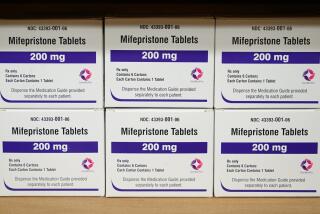Court OKs Shared Liability of Drug Firms in DES Case
- Share via
WASHINGTON — The Supreme Court Monday let stand a state ruling that allows victims of a dangerous drug to collect a share of damages from all of the drug’s makers and sellers, even those that can demonstrate they did not provide the drug to a particular patient.
Normally, a company is required to pay damages only to individuals who used that firm’s product.
But, in the case of DES, a drug sold to many pregnant women to prevent miscarriages until the government banned it in 1972, the victims said that they could not always trace the companies that made and sold the drug. DES was banned after it was linked to cancer in both the mothers who took the drug and their daughters.
Consequently, the New York courts took a different approach in determining liability. In a practice upheld by the state’s high court last April, they proposed to assess each company according to its share of the DES market, regardless of whether it was involved in the manufacture or sale of the drug in a particular case.
It was this ruling, by the New York Court of Appeals, that the Supreme Court let stand by refusing to hear the appeals filed by three drug companies (Rexall vs. Tigue, 89-168, and E. R. Squibb vs. Hymowitz, 89-204). Eli Lilly & Co. joined in the Rexall suit.
The Supreme Court’s action was the latest in a series of decisions in which the court, despite its conservative tenor, came down against business and on the side of the state courts.
The New York courts’ approach to DES is not the first time that state courts have assessed product liability damages according to manufacturers’ shares of the market. In 1980, the California Supreme Court first adopted this “market share” theory of liability in DES litigation.
But the California court allowed companies to escape responsibility for damages in particular cases if they could show they did not make or sell the DES to the woman bringing suit.
By contrast, the New York court did not allow any makers or sellers of DES to escape liability. It concluded it would be “more appropriate for the loss to be borne by those that produced the drug . . . even where the precise manufacturer cannot be identified in a particular action.”
In appealing to the Supreme Court, lawyers for Squibb, which manufactured the drug, and Rexall, which sold it, said they had firm evidence that several women who filed suit in New York did not buy DES made by Squibb or sold by Rexall. The Constitution’s guarantee of “due process of law,” they argued, protected them from punishment for a wrong they did not commit.
A. Edward Grashof, an attorney representing Rexall, said the high court’s dismissal of the appeal was “very discouraging to the pharmaceutical industry.” He noted, however, that companies do not believe DES caused the cancer suffered by several of the plaintiffs in the New York cases, and they will argue that issue during their trials.
Separately, in a setback for military contractors, the Supreme Court let stand a $4.25-million award against General Dynamics for having made a defective ventilation valve in a Navy submarine. The defect resulted in the death of five Navy divers in 1982, and their families won the damage award in a suit against the manufacturer.
Just last year, the Supreme Court had appeared to shield the defense industry from all suits by servicemen or their survivors. In the case of Boyle vs. United Technologies, the justices said contractors were immune from suits for military products made according to the government’s “reasonably precise specifications.”
However, in February, the U.S. 5th Circuit Court of Appeals in New Orleans ruled that Pentagon officials must do more than “rubber stamp” the plans submitted by private contractors. In this instance, the appeals court said, the submarine plans submitted by General Dynamics were simply approved by the Pentagon without much consideration. Therefore, the damage verdict against the contractor can be upheld, the court said.
In their unsuccessful appeal to the high court, lawyers for General Dynamics said this appeals court ruling “essentially dismantles and emasculates the government contractor defense” established in the Boyle case. (General Dynamics vs. Trevino, 89-376.)
More to Read
Inside the business of entertainment
The Wide Shot brings you news, analysis and insights on everything from streaming wars to production — and what it all means for the future.
You may occasionally receive promotional content from the Los Angeles Times.











